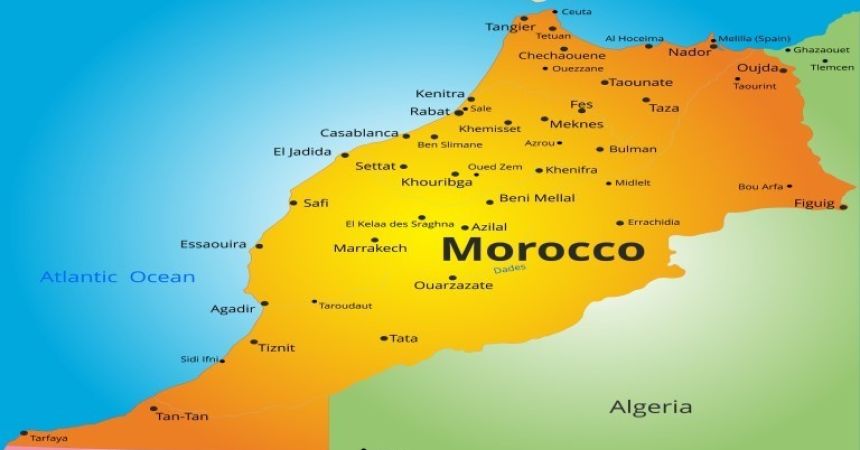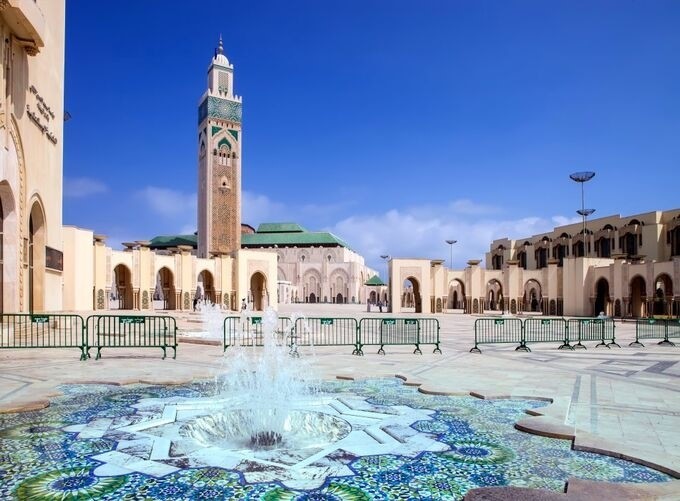
Discovering Morocco
Morocco, a North African country steeped in history and rich in culture, is a captivating destination for travelers. Known for its stunning landscapes, vibrant markets, and enchanting cities, Morocco offers an incredible array of experiences that cater to a diverse range of interests. This guide will delve into Morocco's geography, history, culture, cuisine, attractions, and travel tips, providing essential information for anyone looking to explore this fascinating country.
Geography and Climate in Morocco
Location
Morocco is located in the northwest corner of Africa, bordered by the Atlantic Ocean to the west, the Mediterranean Sea to the north, Algeria to the east, and Western Sahara to the south. The country is characterized by a diverse geography that includes coastal plains, mountain ranges, and expansive deserts.
Major Cities
Marrakech: Known as the "Red City" for its distinct red sandstone buildings, Marrakech is famous for its vibrant souks, historic palaces, and bustling squares.
Fes: Often considered the cultural capital of Morocco, Fes is home to one of the world's oldest universities and boasts a UNESCO World Heritage-listed medina.
Casablanca: The largest city in Morocco, Casablanca is a modern metropolis known for its economic significance and the stunning Hassan II Mosque.
Chefchaouen: Renowned for its blue-painted streets, Chefchaouen is a picturesque town in the Rif Mountains, perfect for relaxation and exploration.
Essaouira: A coastal city with a rich history, Essaouira is known for its charming medina, vibrant arts scene, and beautiful beaches.
Climate Overview
Morocco's climate varies significantly depending on the region. The coastal areas enjoy a Mediterranean climate, while the interior regions experience a more continental climate. The northern mountains can have snowy winters, while the southern desert areas experience extreme heat.
Coastal Areas: Mild, wet winters and hot, dry summers.
Inland Areas: Hot summers and cold winters, particularly in the Atlas Mountains.
Desert Regions: Extremely hot during the day, with cooler temperatures at night.
A Brief History of Morocco
Ancient Civilizations
Morocco has a rich history that dates back to ancient times, with evidence of human settlement dating to the Paleolithic era. The Phoenicians established trading posts along the coast, followed by the Carthaginians and later the Romans, who built cities like Volubilis.
The Islamic Era
In the 7th century, Arab forces invaded Morocco, leading to the spread of Islam. The establishment of the Idrisid dynasty marked the beginning of a unified Moroccan state. Throughout the Middle Ages, various dynasties ruled Morocco, including the Almoravids, Almohads, and Merinids, each leaving their mark on the country’s architecture and culture.
Colonialism and Independence
In the late 19th and early 20th centuries, Morocco became a target for European powers, leading to the establishment of a protectorate by France and Spain. After a long struggle for independence, Morocco gained its sovereignty in 1956. King Mohammed V played a significant role in this process, and the country has since developed a unique blend of tradition and modernity.
Cultural Diversity
Ethnic Groups
Morocco is home to a diverse range of ethnic groups, including Berbers (Amazigh), Arabs, and sub-Saharan Africans. The Berbers are the indigenous people of Morocco, and their culture and language are integral to the country’s identity.
Religion
Islam is the predominant religion in Morocco, with the majority of the population being Sunni Muslims. The country is known for its religious tolerance, and visitors can often observe a harmonious coexistence of different faiths.
Language
Arabic is the official language of Morocco, with Amazigh (Berber) recognized as a national language. French is widely spoken, particularly in urban areas, due to Morocco's historical ties with France. English is becoming increasingly common, especially among younger generations and in tourist areas.
Moroccan Cuisine
Traditional Dishes
Moroccan cuisine is a flavorful blend of Berber, Arabic, and Mediterranean influences. Some must-try dishes include:
Tagine: A slow-cooked stew made with meat (often lamb or chicken), vegetables, and aromatic spices, served in a conical clay pot.
Couscous: A staple dish made from steamed semolina grains, typically served with vegetables and meat.
Harira: A hearty soup made with tomatoes, lentils, chickpeas, and spices, often enjoyed during Ramadan.
Pastilla: A savory pie made with layers of pastry, filled with pigeon or chicken, almonds, and spices, topped with powdered sugar and cinnamon.
Food Culture
Moroccan cuisine is characterized by its communal dining style. Meals are often served on a large platter, and it is customary to eat with your hands, using bread to scoop up food. Hospitality is a cornerstone of Moroccan culture, and guests are treated with great respect and generosity.
Moroccan tea, particularly mint tea, is a significant part of the culture. The traditional tea ceremony is a symbol of hospitality, often involving the pouring of tea from a height to create froth.
Popular Drinks
Mint Tea: A sweet, fragrant tea made with green tea leaves, fresh mint, and plenty of sugar.
Café au Lait: A popular coffee drink made with equal parts coffee and hot milk.
Fresh Juices: Morocco is known for its delicious fresh juices, particularly orange juice, which is widely available in markets and cafes.
Major Attractions in Morocco
Morocco is filled with incredible major attractions in Morocco that showcase its rich history and stunning landscapes.
Marrakech
Marrakech is one of Morocco's most iconic cities, known for its vibrant souks, historic palaces, and lively atmosphere. Key attractions include:
Jemaa el-Fnaa: The main square and marketplace, bustling with street performers, food stalls, and local artisans. It's a UNESCO World Heritage site and the heart of Marrakech.
Koutoubia Mosque: The largest mosque in Marrakech, known for its stunning minaret and beautiful gardens.
Saadian Tombs: A historical site housing the tombs of the Saadian dynasty, adorned with intricate tile work and beautiful gardens.
Majorelle Garden: A stunning botanical garden created by French painter Jacques Majorelle, featuring exotic plants and vibrant colors.
Fes
Fes is known for its medieval architecture and is home to one of the oldest universities in the world, the University of Al Quaraouiyine. Key highlights include:
Fes el-Bali: The historic medina, a UNESCO World Heritage site, filled with narrow alleyways, traditional riads, and artisan workshops.
Bou Inania Madrasa: A beautiful example of Marinid architecture, featuring intricate tile work and wood carvings.
Tanneries: The famous tanneries of Fes, where leather is dyed using traditional methods, providing a unique sensory experience.
Chefchaouen
Trip to Chefchaouen, also known as the "Blue City," is famous for its blue-painted streets and buildings. Nestled in the Rif Mountains, it offers a peaceful atmosphere and stunning views. Visitors can explore:
Medina: The charming medina is filled with local shops selling handicrafts, textiles, and traditional Moroccan items.
Ras El Maa: A nearby waterfall and stream where locals gather, offering a picturesque spot for relaxation.
Casablanca
Casablanca is Morocco's largest city and a modern metropolis. While it is often seen as less traditional than other Moroccan cities, it boasts impressive architecture and vibrant life. Key attractions include:
Hassan II Mosque: One of the largest mosques in the world, with stunning ocean views and intricate architecture.
Corniche: A waterfront promenade lined with cafes, restaurants, and beaches, perfect for leisurely strolls.
Royal Palace of Casablanca: While not open to the public, the exterior is impressive and worth seeing.

Essaouira
Essaouira is a coastal city known for its relaxed atmosphere, historic medina, and beautiful beaches. Key highlights include:
Medina: A UNESCO World Heritage site filled with narrow streets, artisan shops, and vibrant markets.
Essaouira Citadel: A historic fortress offering stunning views of the ocean and coastline.
Beaches: Essaouira's beaches are perfect for water sports, including windsurfing and kitesurfing.
The Sahara Desert
The Sahara Desert is one of Morocco's most breathtaking natural wonders. Visitors can experience the desert through:
Camel Treks: Explore the dunes of Merzouga on a camel, often culminating in a night spent in a traditional Berber tent under the stars.
Sandboarding: An adventurous activity for thrill-seekers, sandboarding on the golden dunes provides an exhilarating experience.
Adventure Activities
Morocco offers a variety of adventure activities for those looking to explore beyond the historical sites.
Hiking in the Atlas Mountains
The Atlas Mountains, which stretch across Morocco, offer stunning hiking opportunities. Popular trails include:
Toubkal National Park: Home to Mount Toubkal, the highest peak in North Africa, this park offers trekking routes for all levels.
Imlil Valley: A picturesque village serving as a base for hikes in the surrounding mountains.
Exploring the Sahara
Exploring the Sahara Desert is a must for adventurous travelers. Popular activities include:
Overnight Desert Tours: Many tour operators offer guided tours from Marrakech to the Sahara, including camel rides and nights in Berber tents.
Quad Biking and Sandboarding: For thrill-seekers, quad biking through the dunes or sandboarding down them provides an exhilarating way to explore the desert landscape.
Surfing in Taghazout
Taghazout, a coastal village near Agadir, is known for its surf spots. The area offers excellent waves suitable for both beginners and experienced surfers. Surf schools and rental shops are widely available, making it easy to hit the waves.
Visiting Berber Villages
Experience traditional Berber culture by visiting villages in the Atlas Mountains. Visitors can interact with local families, learn about their customs, and even participate in cooking classes to prepare traditional meals.
Travel Tips
Visa Requirements
Most nationalities do not require a visa for stays of up to 90 days in Morocco. However, it is advisable to check the latest visa regulations based on your nationality before traveling.
Best Time to Visit Morocco
The best time to visit Morocco is during the cooler months, from October to April. This period offers mild temperatures, making it ideal for exploring cities and outdoor activities. The summer months can be extremely hot, particularly in the interior and desert regions.
Local Etiquette
Moroccans are known for their hospitality and friendliness. When greeting locals, a handshake is common, and it’s polite to use the right hand for gestures. Dress modestly, especially when visiting religious sites, and be respectful of local customs and traditions.
Bargaining is expected in markets and shops, so don't hesitate to negotiate prices. It’s also customary to greet shopkeepers and locals with “salaam” (peace) before starting a conversation.
Transportation in Morocco
Morocco has a range of transportation options for travelers. Taxis and ride-hailing services like Uber are available in major cities, making it easy to get around. Buses and trains connect different regions, with sleeper trains offering a comfortable way to travel between cities.
Renting a car is an option, but be aware that driving in Morocco can be challenging due to traffic and road conditions. Many travelers opt for guided tours or private drivers to explore the country more comfortably.
Discover Morocco: Holiday Packages for Every Traveler
Morocco is a country that captivates the heart and soul of every traveler who sets foot on its diverse landscapes. With its rich history, breathtaking scenery, and warm hospitality, it offers an array of experiences that cater to all types of visitors. Whether you're exploring the vibrant souks of Marrakech, trekking through the Atlas Mountains, or relaxing on the beaches of Essaouira, Morocco promises unforgettable memories.
Additional Resources
Books and Guides: Consider reading about Morocco's history and culture to enhance your understanding before your visit.
Travel Blogs: Follow travel blogs for tips and personal experiences from other travelers to help plan your itinerary.



